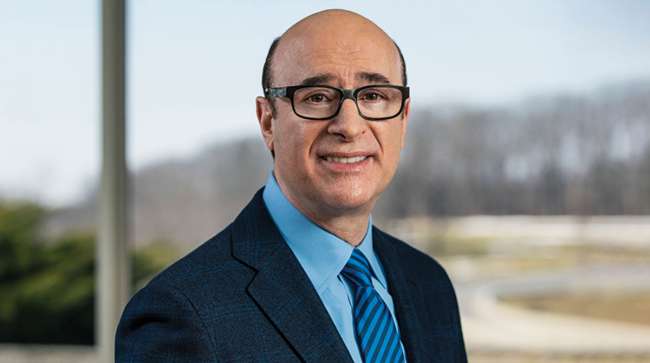Senior Reporter
XPO Chairman Jacobs Says Transportation Economy Shows Signs of Slowing

[Stay on top of transportation news: Get TTNews in your inbox.]
XPO Logistics Inc. CEO Brad Jacobs said that the transportation-specific economy remains strong but is slowing and not as vibrant as it was earlier in the year.
Jacobs, also chairman of the Greenwich, Conn.-based carrier, made his comments during a presentation at the Economic Club of New York on April 13.
He also noted that international events, including Russia’s invasion of Ukraine and the possibility of a slowing U.S. economy, higher interest rates and rising inflation, are causes for concern.
Brad Jacobs: The future of the world of logistics is automation. 70% of the current communication interface in the industry is done electronically. #ECNYJacobs — The Economic Club NY (@EconClubNY) April 13, 2022
“Fasten your seat belt and tighten up. We’re in a place where the future is not very clear what is going to happen. In the supply chain, you look at truckload rates, what’s the price to transport a full truckload of freight from point A to point B, and they’re down 30% in the last month. That’s a huge move in a few weeks,” Jacobs said. “There’s been a shift in supply and demand. There are still elevated prices, but it’s not as strong as it was 30 days ago.”
He also said other trucking-specific indicators point to a slowing freight market.
“You look at the load-to-truck ratio, how many shipments are there for every truck that is available. That was about 11-to-1 just a few months ago, and now it’s down to 4-to-1,” Jacobs said. “You look at tender rejection rates, and you can look at them to tell how tight the market it is. They’re down about 11% year-over-year, and they were down about 4% a year ago.”
The tender rejection rate is a measurement of carriers’ willingness to accept or reject the loads that are tendered to them by shippers.
Jacobs said as the pandemic eases, the consumer sector and industrial side of the economy remained strong, but he believes there are signs of slowing.
“We are not in a typical cycle. In fact, I have never seen a cycle, a situation like this, where there are so many different variables and so many have an effect on the supply chain and the economy. There are plenty of things to watch,” he said. “The consumer is still very strong, even though there is a lessening in consumer confidence, the consumer has a lot of money; they are sitting on a lot of cash. The industrial economy is in an earlier stage of recovery, and it has more upside to go from here.”
Brad Jacobs explains that there needs to be less government interference to correct the global supply chain issues. According to Jacobs, the government overstimulated during the pandemic and was a major contributor to inflation. #ECNYJacobs — The Economic Club NY (@EconClubNY) April 13, 2022
Jacobs said he is concerned about the rising rate of inflation, which in March jumped to an annual rate of 8.5%, according to the Labor Department, making it the steepest increase in consumer prices since December 1981.
Jacobs believes both the Trump and Biden administrations deserve some of the blame for the rising cost of goods.
“We got into this situation because the government, with all good intentions, overstimulated in both administrations. The previous administration put in $2 trillion in stimulus and the current administration doubled that, and Europe also put in $4 trillion,” Jacobs said. “We put in way too much stimulus, and this contributed to inflation and we have the hangover now and it’s going to take a while.”

Transport Topics' Seth Clevenger and Marissa Gamache take you through the process of determining North America’s largest 3PLs in the expanded Transport Topics Top 100 Logistics Companies list. Tune in above or by going to RoadSigns.TTNews.com.
“I think the Fed does play an important role when things get way out of whack, interjecting into the process, when there is high inflation to slow that down. The tricky part is the Fed is late, the Fed should have raised rates 25 basis points here, 25 basis points there, a year ago, when inflation started raising its ugly head, and we waited. I would not want to have Chairman Jay Powell’s job.”
During the presentation, Jacobs was asked what technological changes he sees coming that will significantly disrupt the manufacturing and transportation industries, and in turn increase domestic manufacturing.
“The main long-term technological driver that is going to impact our industry is three-dimensional printing. It’s had a slow start, but it’s going to happen,” Jacobs asserted. “It’s going to change the entire model, the entire transportation industry. Right now, the world is functioning … on this outdated model of sourcing cheap labor overseas and then paying huge amounts to get it transported to the consumer on a plane, boat, then there’s drayage, and onto a train or a truck to a warehouse in Kansas City.”
Long term, Jacobs believes 3D printing will be a significant benefit because manufacturing will be much closer to home, eventually reducing transportation costs.
“When you have 3D manufacturing, you don’t need all of that,” he said. “Many goods can be manufactured in your basement or a FedEx Kinkos, and that changes the whole industry. It will be a different paradigm. You won’t be so dependent on long supply chains, and there will be much shorter supply chains.”
XPO Logistics ranks No. 3 on the Transport Topics Top 100 list of the largest for-hire carriers in North America and No. 3 on the TT Top 100 list of the largest logistics companies.
Want more news? Listen to today's daily briefing below or go here for more info:

